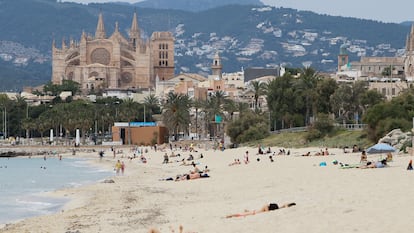Spain’s proposal for travel corridors could allow international tourists to visit before July 1
The measure would provide relief to the Spanish regions most dependent on tourism, such as the Canaries and the Balearic Islands

The Spanish government proposed on Tuesday that the European Union open up travel routes between regions in the EU that have controlled the spread of the coronavirus. Tourism Minister Reyes Maroto made the proposal at a press conference following a Cabinet meeting, and the idea has already reached the European Commission.
The proposal involves opening up travel corridors between different areas and regions of countries in the EU. In other words, parts of a country could reopen to international tourists before the whole country does so. In this case, a speedier return of tourism could be negotiated by Spain’s regions via agreements with regions of other EU member states with a similar level of control over the coronavirus epidemic.
Sources from the Spanish government recognize that this initiative could allow international tourists to arrive before July 1, which is when the obligatory 14-day quarantine for overseas arrivals is set to come to an end. “If there are areas that can [reopen to international tourists] earlier, it doesn’t make sense to wait and lose a whole week,” said these sources.
The border controls and the restrictions on travel have to be lifted in areas that have an epidemiological situation that is evolving positivelyTourism Minister Reyes Maroto
The measure would provide relief to the Spanish regions most dependent on tourism, such as the Canary Islands and the Balearic Islands. Indeed, the regional Balearic government has already begun negotiating with different länder in Germany, according to ministry sources and regional authorities. The archipelago is waiting for the central government to give the green light so that it can finalize the agreements and reactivate the tourism sector as soon as possible.
“The border controls and the restrictions on travel have to be lifted in areas that have an epidemiological situation that is evolving positively,” said Maroto on Tuesday. The idea to ease the lockdown restrictions in phases and by regions is similar to the European Commission’s plan for the deescalation of confinement measures across Europe. The concept was introduced in a declaration, driven by Spain, that called for a European plan to reactivate the tourism industry and also spoke of periphery and insular regions. In this context, the proposal to create safe travel corridors, which do not pose a risk to either the tourist or the destination, is very fitting.
At the Tuesday press conference, Maroto said it was important for EU members to work hard to define common norms for reopening countries in order to recover freedom of movement within the EU. “We are working to reactivate tourism ahead of summer with the utmost guarantees of health security,” she said.
The proposal to open travel corridors between specific regions would greatly bolster tourism in Spanish areas like the Balearic Islands, because it would facilitate the arrival of international visitors. The regional Balearic government has been working for weeks to make this possible and has maintained contact with large tour operators such as TUI Group, as well as German authorities. The region has also begun talks with the tour operators from the United Kingdom. “Nothing is finalized yet, but there are talks and we have asked the government for permission to work with Germany,” confirmed a source from the regional government.
Airlines and tour operators prepare to return to Spain
English version by Melissa Kitson.
Tu suscripción se está usando en otro dispositivo
¿Quieres añadir otro usuario a tu suscripción?
Si continúas leyendo en este dispositivo, no se podrá leer en el otro.
FlechaTu suscripción se está usando en otro dispositivo y solo puedes acceder a EL PAÍS desde un dispositivo a la vez.
Si quieres compartir tu cuenta, cambia tu suscripción a la modalidad Premium, así podrás añadir otro usuario. Cada uno accederá con su propia cuenta de email, lo que os permitirá personalizar vuestra experiencia en EL PAÍS.
¿Tienes una suscripción de empresa? Accede aquí para contratar más cuentas.
En el caso de no saber quién está usando tu cuenta, te recomendamos cambiar tu contraseña aquí.
Si decides continuar compartiendo tu cuenta, este mensaje se mostrará en tu dispositivo y en el de la otra persona que está usando tu cuenta de forma indefinida, afectando a tu experiencia de lectura. Puedes consultar aquí los términos y condiciones de la suscripción digital.









































